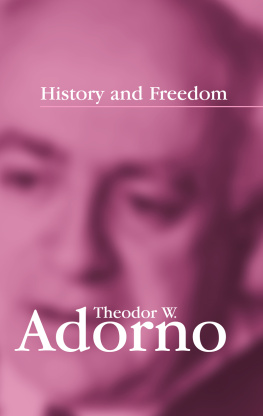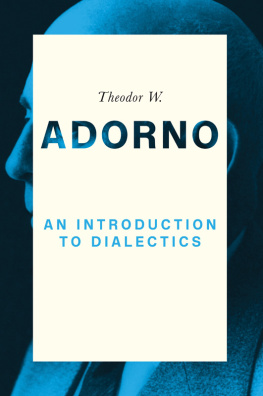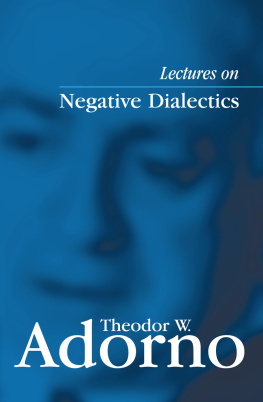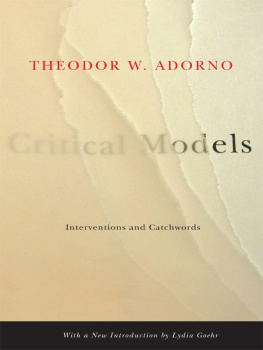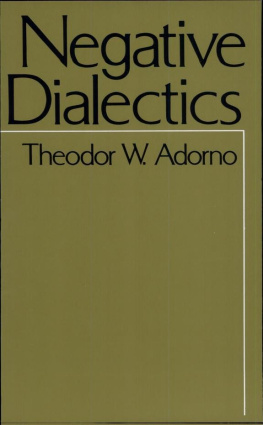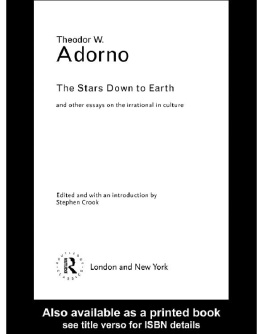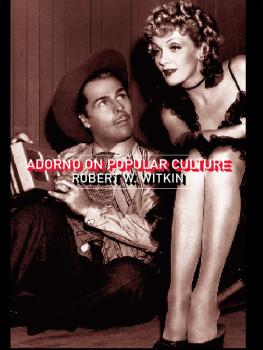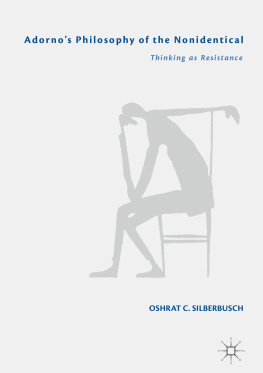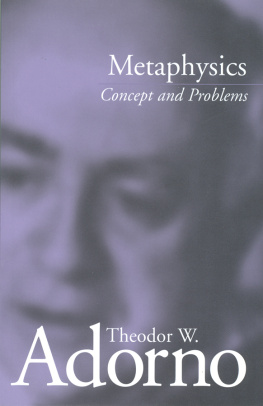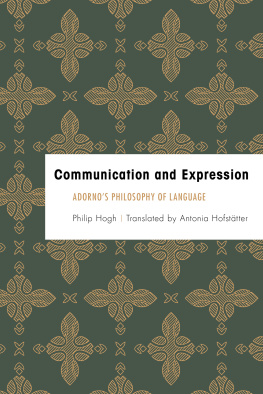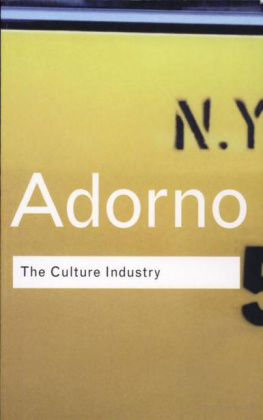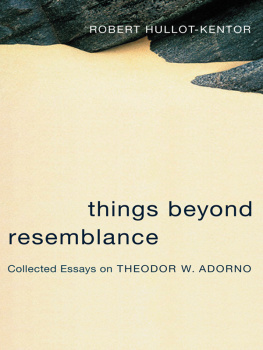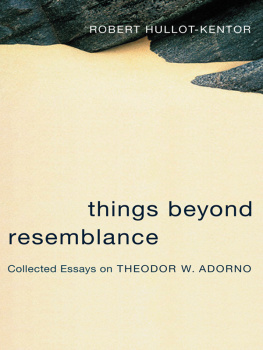Theodor W. Adorno - The Culture Industry: Selected Essays on Mass Culture
Here you can read online Theodor W. Adorno - The Culture Industry: Selected Essays on Mass Culture full text of the book (entire story) in english for free. Download pdf and epub, get meaning, cover and reviews about this ebook. publisher: ROUTLEDGE, genre: Science. Description of the work, (preface) as well as reviews are available. Best literature library LitArk.com created for fans of good reading and offers a wide selection of genres:
Romance novel
Science fiction
Adventure
Detective
Science
History
Home and family
Prose
Art
Politics
Computer
Non-fiction
Religion
Business
Children
Humor
Choose a favorite category and find really read worthwhile books. Enjoy immersion in the world of imagination, feel the emotions of the characters or learn something new for yourself, make an fascinating discovery.
- Book:The Culture Industry: Selected Essays on Mass Culture
- Author:
- Publisher:ROUTLEDGE
- Genre:
- Rating:3 / 5
- Favourites:Add to favourites
- Your mark:
- 60
- 1
- 2
- 3
- 4
- 5
The Culture Industry: Selected Essays on Mass Culture: summary, description and annotation
We offer to read an annotation, description, summary or preface (depends on what the author of the book "The Culture Industry: Selected Essays on Mass Culture" wrote himself). If you haven't found the necessary information about the book — write in the comments, we will try to find it.
Theodor W. Adorno: author's other books
Who wrote The Culture Industry: Selected Essays on Mass Culture? Find out the surname, the name of the author of the book and a list of all author's works by series.
The Culture Industry: Selected Essays on Mass Culture — read online for free the complete book (whole text) full work
Below is the text of the book, divided by pages. System saving the place of the last page read, allows you to conveniently read the book "The Culture Industry: Selected Essays on Mass Culture" online for free, without having to search again every time where you left off. Put a bookmark, and you can go to the page where you finished reading at any time.
Font size:
Interval:
Bookmark:
The Culture Industry
Adorno expounds what may be called a new philosophy of consciousness. His philosophy lives, dangerously but also fruitfully, in proximity to an ascetic puritanical moral rage, an attachment to some items in the structure and vocabulary of Marxism, and a feeling that human suffering is the only important thing and makes nonsense of everything else. Adorno is a political thinker who wishes to bring about radical change. He is also a philosopher, with a zest for metaphysics, who is at home in the western philosophical tradition.
Iris Murdoch
This collection of Adornos provocative and disturbing essays on The Culture Industry will introduce his thinking to a wide readership. The introduction by J. M. Bernstein shows that Adornos voice is potentially the greatest challenge to the debate over postmodernity, exposing its social and political collusions.
Gillian Rose, author of Loves Work
Theodor W. Adorno
The Culture Industry
Selected essays on mass culture
Edited and with an introduction
by J. M. Bernstein

London and New York
CULTURE AND ADMINISTRATION
Whoever speaks of culture speaks of administration as well, whether this is his intention or not. The combination of so many things lacking a common denominator such as philosophy and religion, science and art, forms of conduct and mores and finally the inclusion of the objective spirit of an age in the single word culture betrays from the outset the administrative view, the task of which, looking down from on high, is to assemble, distribute, evaluate and organize. The word culture itself, in its specific use, is scarcely older than Kant, and its beloved adversary, civilization, did not establish itself at least in Germany until the nineteenth century; it was then elevated to the level of a slogan by Spengler. In any case, the present-day proximity of the concepts culture and administration is easily detected within the practices of language, which in radio broadcasting attach the title The Cultural World to a province where everything possible is encountered, in so far as it corresponds to a more or less precise idea of niveau and cultivation in contrast to the sphere of entertainment that province of administration, in other words, which is reserved for a spirit which is not spirit at all, but rather a service to listeners, devoted to light music along with its literary and dramatic pendants.
At the same time, however according to German concepts culture is opposed to administration. Culture would like to be higher and more pure, something untouchable which cannot be tailored according to any tactical or technical considerations. In educated language, this line of thought makes reference to the autonomy of culture. Popular opinion even takes pleasure in associating the concept of personality with it. Culture is viewed as the manifestation of pure humanity without regard for its functional relationships within society. In spite of its self-righteous assonance, the word culture cannot be avoided; this proves to what a degree the category, correctly criticized hundreds of times, is both fitting for and dedicated to the world as it is namely to the administrated world. Nonetheless, no half-way sensitive person can overcome the discomfort conditioned by his consciousness of a culture which is indeed administrated. As Eduard Steuermann once formulated it, the more that is done for culture, the worse it fares. This paradox could be developed as follows: culture suffers damage when it is planned and administrated; when it is left to itself, however, everything cultural threatens not only to lose its possibility of effect, but its very existence as well. It is neither possible to accept uncritically the concept of culture, long permeated by ideas of departmentalization, nor to continue to shake ones head conservatively about what is being done to culture in the age of integral organization.
The aversion towards the words culture and administration an aversion by no means free of barbarism and overshadowed by the urge to release the safety catch on a revolver must not conceal that a certain truth is involved in it. This makes possible the treatment of culture as something of a unity, as for example the heads of cultural departments of cities are wont to do when they unite in the hands of an expert a series of objects which for the moment actually do have something in common. This common factor stands in contrast to everything which serves the reproduction of material life, the literal self-preservation of the human being in general, and the needs of his mere existence. Everyone knows that these boundaries cannot be clearly fixed. From the beginning it has been argued whether the spheres of justice and politics are to be included in culture; they are, at any rate, not to be found in the cultural departments organized by administration. It is further difficult to deny that due to the total tendencies at work in the present, many facets traditionally allotted to culture come to resemble material production more and more: the natural sciences far into the highest reaches of theoretical discipline philosophic according to older ways of thinking, in a manner hardly expected from the traditional perspective of culture determine to an ever greater degree the down-to-earth fate of man. The progress of these sciences is, in turn, directly dependent upon the forces of material life, that is, of economics. This is the situation before which man stands today and which is so discomforting to him. The point is missed, however, if this situation is merely discussed to death by concentrating upon supposedly transitional phenomena. The current inclination to deny embarrassing contradictions in this matter by means of conceptual distinctions and manipulations a type of vulgarized epistemology must be resisted. For the moment the simple fact must be recognized that that which is specifically cultural is that which is removed from the naked necessity of life.
This, however, does not offer dispensation from the consideration of the meaning of administration, for this is no longer merely a national or communal institution existing in clear separation from the free play of social forces. The tendency of every institution towards expansion both quantitatively and qualitatively was designated as immanent by Max Weber in The Theory of Social and Economic Organization (Part III, Chapter VI). contrast to colleague-like older forms which are either honorary or extra-official (p. 600f). It is precisely the example of the SS, however, which shows to what degree the formal concept of rationality, imputed by Weber and restricted to an ends-means relationship, impedes judgement on the rationality of means. In Webers own theory of rationality, there is a suspicion of the imprint of administrated thought. The mechanism through which independence is established by organizations would have to be defined more specifically than was done by Weber or even in the formal sociology of Simmel, who simply contrasted phenomena of social ossification with life as a metaphysical actuality. Organizations of convenience in an antagonistic society must necessarily pursue particular ends; they do this at the expense of the interests of other groups. Therefore, obduracy and reification necessarily result. If such organizations continued to occupy a subordinate position within which they were totally open and honest towards their membership and its direct desires, they would be incapable of any action. The more firmly integrated they are, the greater is their prospect for asserting themselves in relation to others. The advantage of totalitarian monolithic nations over liberalist nations in power politics which can be internationally observed today is also applicable to the structure of organizations of small format. Their external effectivity is a function of their inner homogeneity, which in turn is dependent upon the socalled totality gaining primacy over individual interests, so that the organization
Next pageFont size:
Interval:
Bookmark:
Similar books «The Culture Industry: Selected Essays on Mass Culture»
Look at similar books to The Culture Industry: Selected Essays on Mass Culture. We have selected literature similar in name and meaning in the hope of providing readers with more options to find new, interesting, not yet read works.
Discussion, reviews of the book The Culture Industry: Selected Essays on Mass Culture and just readers' own opinions. Leave your comments, write what you think about the work, its meaning or the main characters. Specify what exactly you liked and what you didn't like, and why you think so.


